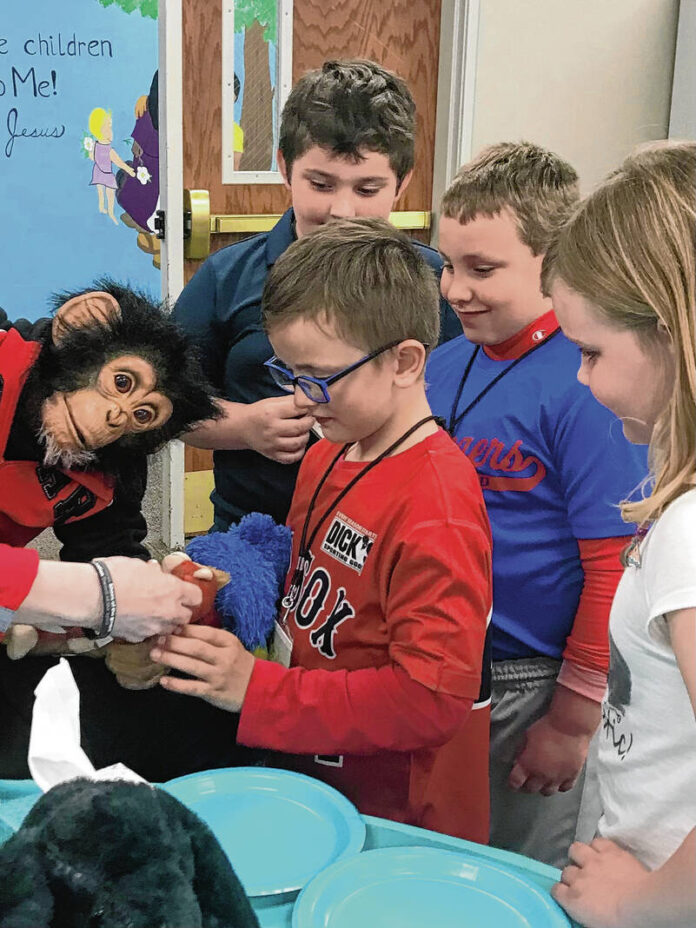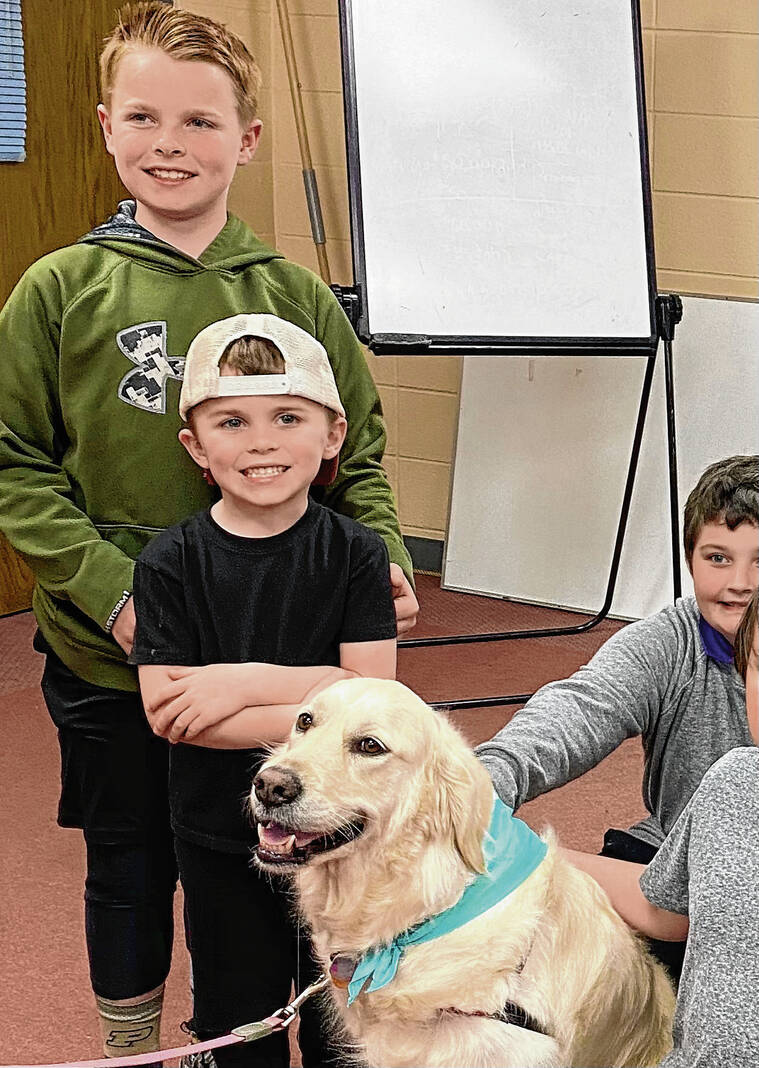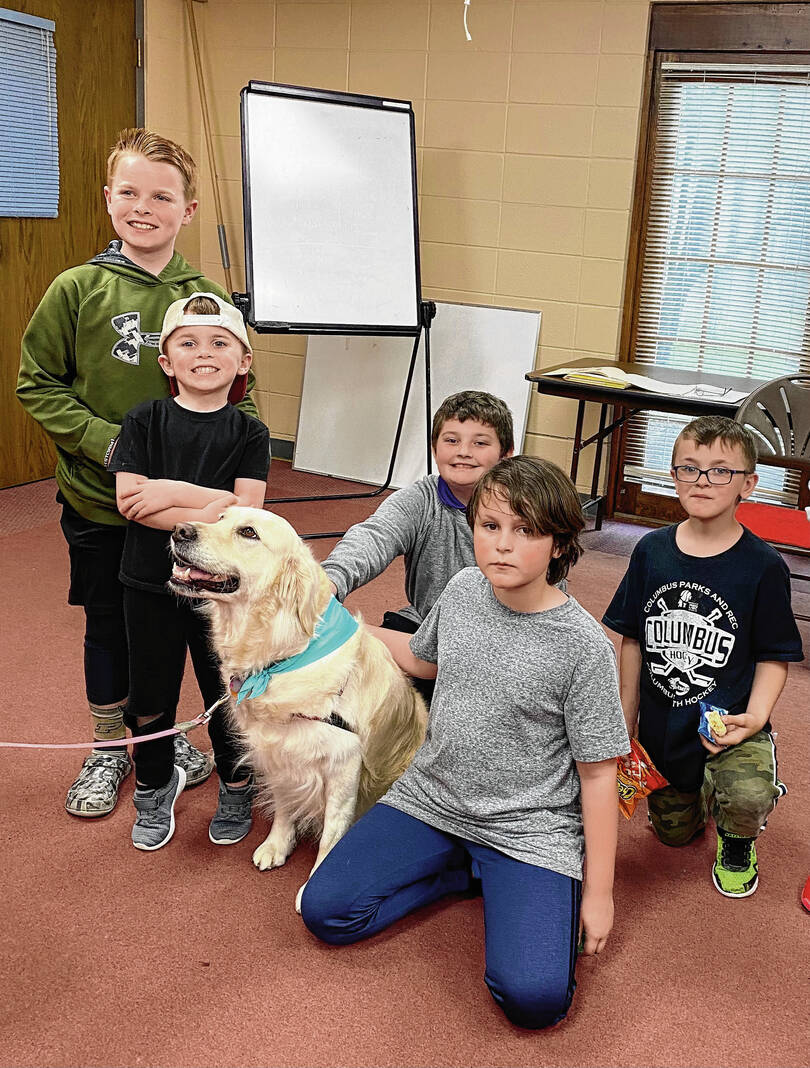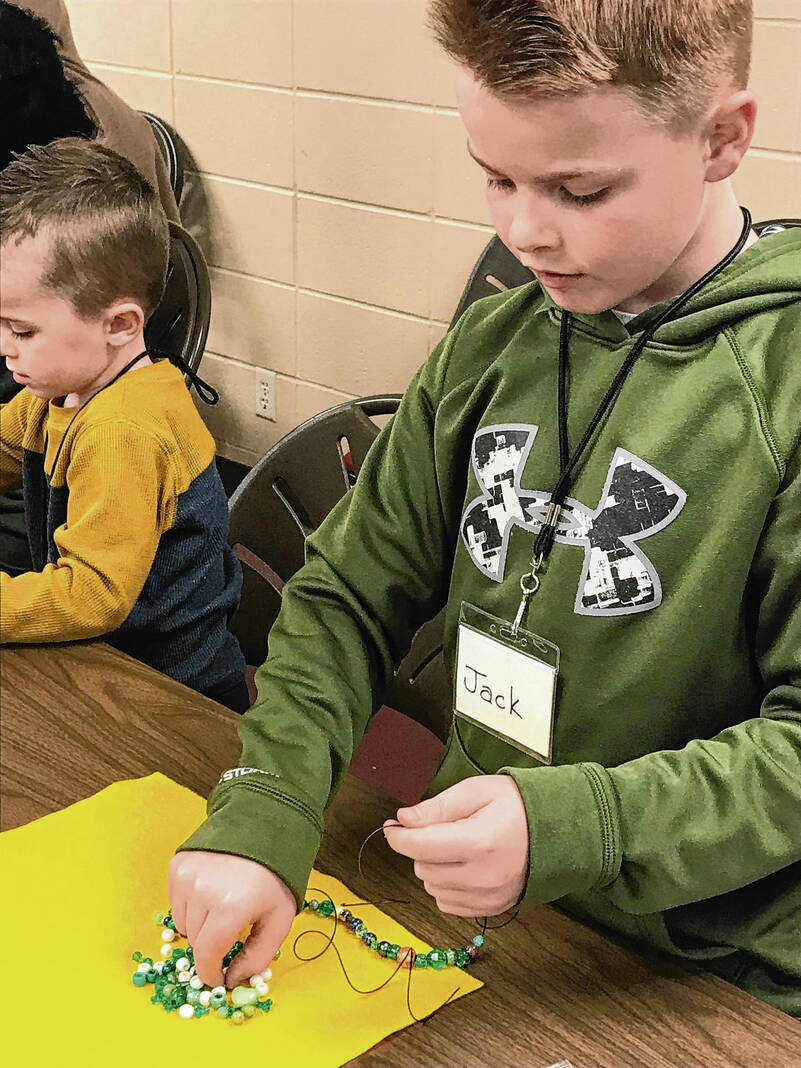
Children attending the Caterpillar Kids grief support program in 2022 at Franciscan Health Indianapolis interact with Bailey, a puppet used to help them express themselves after a loved one has died. Franciscan Health is offering grief support programs for children and teens, with the sessions lasting from April 5 to May 3.
SUBMITTED PHOTO BY FRANCISCAN HEALTH
The weight of loss hung heavy over the group.
Children had come to Franciscan Health Indianapolis’ Caterpillar Kids program under the worst of circumstances — they were burdened with the grief of a parent or other loved one who had died.
The kids all had sorrow in common. But through sharing and carefully planned activities, they can understand that they are not alone in their situation.
“We’ve found that just getting those kids in similar age ranges together, even in that first night, they’ve taken a huge step of healing,” said Karla Riggs Norton, bereavement coordinator for Franciscan Hospice and Hospice House. “They understand that they’re not weird, they’re not the only kid in the world who lost their mom, that other kids are feeling like them. That’s a big part of it.”
Child bereavement is a growing concern among health officials. The grief of losing a parent, sibling, grandparent or other loved one can take a serious toll on a child’s well-being, and without proper intervention, can lead to physical, emotional and behavioral issues that last a lifetime.
More than 2.2 million children under the age of 18 in the United States have experienced the death of a co-resident parent, and as a result of their loss, many of these children face significant physical, social and economic hardships.
Helping kids process death in a healthy way has to be a priority, officials say.
“Childhood bereavement is associated with other public emergencies that the nation is focused on,” said Joyal Mulheron, founder and executive director of Evermore, a national nonpartisan nonprofit dedicated to advancing bereavement care for all bereaved children and families. “When a child experiences the death of a parent, particularly at this earlier formative ages, it can really start the child down a path toward these other public emergencies.”
In December, Evermore released the findings of its report, “America’s Forgotten Orphans.” The research was developed in collaboration with The Pennsylvania State University and the University of Southern California, and was the first of its kind to examine the current and historical trends in childhood bereavement.
Evermore pursued the report as a way to quantify the physical, social and economic hardship these children experience, Mulheron said. The hope is to advocate for all parentally bereaved children, particularly as state and federal government officials contemplate legislation and policies that prioritize support only for children who have lost a parent to COVID-19.
“It’s not how the parent died that mattered, it’s that the parent died. If we move forward with a national strategy that only focused on COVID orphans, we are excluding those children who have lost parents to homicide, overdose, suicide and other public emergencies, as well as cancer and heart disease,” Mulheron said. “But the associations and the aftermath for those children are all the same.”
Among its findings, the report uncovered that every day, 850 children in the United States experience the death of a parent.
More than 2.2 million children under the age of 18 in the United States have experienced the death of a parent, accounting for three percent of the nation’s 72 million children. Indiana had 51,924 parentally bereaved children.
“Because of all of these concurrent mortality epidemics the U.S. is experiencing, childhood bereavement has increased precipitously across every ethnic and racial category,” Mulheron said.
In the Indianapolis area, a number of programs are offered to help children in the aftermath of a parent’s death.
Brooke’s Place is an Indianapolis-based organization providing support groups, therapy services and education to help children, teens, young adults and their families as they deal with grief. The organization hosts ongoing grief support groups for children and adolescents, who can find healing through peers who have gone through similar losses.
Community Health Network hosts a free camp each year for children who’ve suffered loss: Camp Unity, which runs from Aug. 25 to 27 this year.
At Franciscan Health Indianapolis, Caterpillar Kids has been offered for more than 20 years. The idea was to provide ministry to the children and teens of families who were receiving hospice services.
Organizers went with the “Caterpillar” theme to signify the growth that participants go through during the grieving process.
“They grow and they transform, and they finally can soar after they’ve gotten through all of these stages of grief,” said Kathy Sorenson, a volunteer with the Caterpillar Kids program.
In recent years, they’ve opened the program up to the community; school systems and social agencies have reached out when they have youth in need of bereavement support.
“We have materials and work with children all year long,” Riggs Norton said. “We work with all ages of children who have had their mom or dad, or grandparents or great-grandparents, or siblings who have died,” Riggs Norton said. “It’s awful — it’s just so hard.”
Children are broken into age groups, with kids ages 5 to 12 taking part in the Caterpillar Kids program, while those ages 13 to 17 are in the teen-centric group.
Having that connection with other young people is a key part of the healing.
“They understand that what they’re feeling is OK, their ups-and-downs are OK,” Sorenson said.
Caterpillar Kids organizers find unique ways to allow the children to tell their story. They use art, music, and other forms of expression to describe how they’re feeling and what they’re going through.
One night, they’ll bring in special items connecting them to their loved ones. Therapy dogs have been integrated into the program.
“We know if we can bring what we’re feeling on the inside, in our gut, onto the outside, you’re actually able to mourn. Just grieving doesn’t heal, but mourning does. It helps to cry, it helps to talk, it helps to pray, whatever we can to get it out,” Riggs Norton said.
Sorenson has a furry friend, Bailey the puppet, who interacts with the kids during the program as well.
“We find ways that they can tell us about their loved one, over and over and over and over, as many times as they need to in this safe place,” Riggs Norton said.
The program is designed to be comforting and soothing, aiding the children as they go through their grieving. An emphasis is placed on having fun, with snacks and music. But the work being done is very serious.
When compared to non-bereaved children, parentally bereaved children are at heightened risk of academic failure, mental illness, substance abuse, violent crime, self-harm, suicide attempts, suicide and premature death from all causes, Mulheron said.
The death of a parent becomes an initiating event, leaving children vulnerable to these and many other risks that can alter the trajectory of their lives. An orphaned child’s potential for lifelong success, well-being, and prosperity depends on the support he or she receives soon after bereavement.
“The federal governments and state governments should be looking at childhood bereavement as a public health factor in their initiatives and their policies,” Mulheron said.
By educating children how to understand and process grief, it gives them the tools to deal with the inevitable loss that comes throughout life.
“We invite them to begin to understand their feelings, and express those. What they learn at Caterpillar Kids can help them the rest of their lives, with any kind of coping,” Riggs Norton said.
AT A GLANCE
Grief support for kids and teens
What: Programs to help young people after the death of a loved one
Who: Franciscan Health Indianapolis
When: April 5, 12, 19 and 26, and May 3
Where: Christ United Methodist Church, 8540 U.S. 31 S., Indianapolis
Programs
Caterpillar Kids: A free support gropu that offers learning opportunities for kids ages 5-12, with sessions including crafts, snacks and drinks and the opportunities for each child to talk about their loved one who died.
Teen Grief Support: A program from teens ages 13-17 where they can share their emotions after the death of a loved one.
All groups are free, but people must register in advance. Contact Karla Riggs Norton at 318-528-2636 or [email protected] to register.










